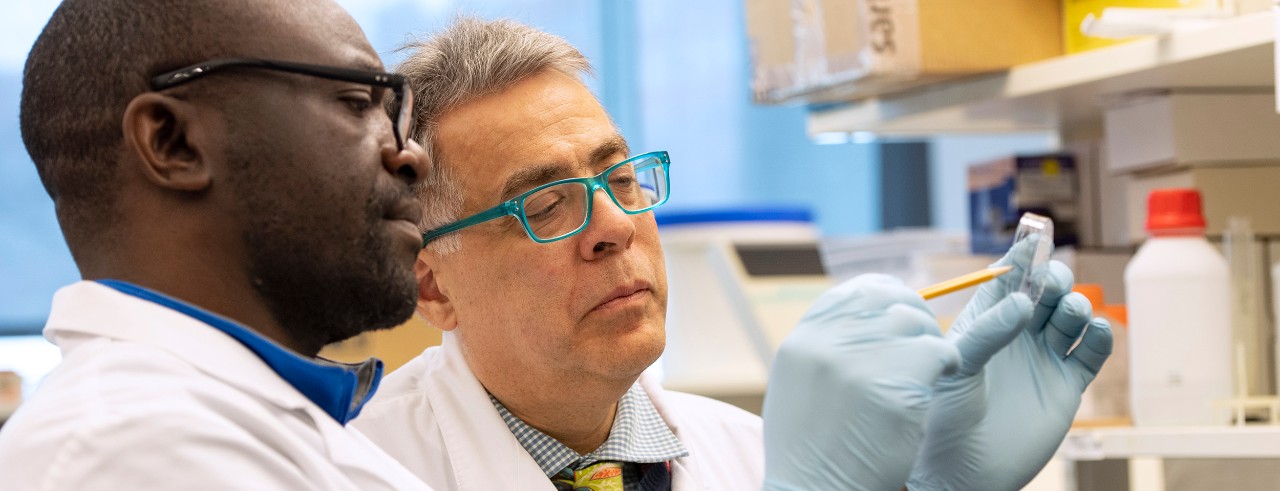
Phase I trials at UC examine safety of immunotherapies for cancer
Only offered locally at UC, the trials will study ways the immune system can be stimulated to fight lung and bladder cancers.
Two Phase I clinical trials are being offered at the University of Cincinnati (UC) to investigate the safety and use of novel immunotherapies for lung and bladder cancers.

John Morris, MD (right), is the director of the Phase I Experimental Therapeutics Program, the only program of its kind locally. Photo credit: Colleen Kelley
Only offered locally at UC, these trials will study bioengineered antibodies being used to stimulate the immune system to attack cancerous cells for a more direct and effective approach to treating cancer.
“These trials are Phase I trials, meaning they are the first step in testing therapies in humans; they are trials intended to evaluate safe dosages, the best methods of administration of a therapy and frequency of administration,” says John Morris, MD, professor of medicine at the UC College of Medicine, UC Health oncologist and principal investigator on these trials. Morris also leads the UC Phase I Experimental Therapeutics Program, which is the only program of its kind locally. “Phase I trials typically include less than 30 people and are administered in a closely-monitored setting where patients can be observed and followed,” he adds.
Research like this is an example of the university’s innovation agenda, one of the key platforms of Next Lives Here, UC’s strategic direction.
For the first trial, looking at therapies for lung cancer, researchers are studying a bioengineered antibody with two parts—one of which binds to programmed death-ligand 1 (PD-L1), an immune-suppressing protein produced by cancer cells which affects anti-cancer activity of T cells, and the other part binding to and blocking transforming growth factor-beta 1 (TGF-β1), a protein that stimulates cancer cell growth and decreases the body’s immune responses, in an effort to ramp up immunity and fight off cancerous cells.
For the second trial, researchers are studying the use of targeted Interleukin-12 (NHS-IL-12), a protein that stimulates the growth and function of T cells, and combining it with the drug avelumab, a Food and Drug Administration-approved anti-PD-L1 antibody treatment that has been used to treat other cancers, to target bladder cancer cells in patients that have not responded to standard therapy.
T cells are a type of white blood cell actively involved in the body’s immune response to seek out cancer cells and kill them.
Therapies will be administered intravenously or as a subcutaneous injection, and patients will be closely monitored for tumor response and side effects.
“The hope with immunotherapies for cancer is to directly target the cancerous cells, leaving other healthy cells unharmed and eliminating side-effects for patients,” Morris says. “However, first, we must ensure that dosage and the way we administer the therapies to patients is safe and effective. We are hopeful that these types of therapies provide another option for patients undergoing care for lung and bladder cancers.”
Top photo credit: Colleen Kelley
For more information on how to enroll in these trials or others, call 513-584-0599.
Related Stories
Before the medals: The science behind training for freezing mountain air
February 19, 2026
From freezing temperatures to thin mountain air, University of Cincinnati exercise physiologist Christopher Kotarsky, PhD, explained how cold and altitude impact Olympic performance in a recent WLWT-TV/Ch. 5 news report.
Discovery Amplified expands research, teaching support across A&S
February 19, 2026
The College of Arts & Sciences is investing in a bold new vision for research, teaching and creative activity through Discovery Amplified. This initiative was launched through the Dean’s Office in August 2024, and is expanding its role as a central hub for scholarly activity and research support within the Arts & Sciences (A&S) community. Designed to serve faculty, students, and staff, the initiative aims to strengthen research productivity, foster collaboration, and enhance teaching innovation. Discovery Amplified was created to help scholars define and pursue academic goals while increasing the reach and impact of A&S research and training programs locally and globally. The unit provides tailored guidance, connects collaborators, and supports strategic partnerships that promote innovation across disciplines.
Blood Cancer Healing Center realizes vision of comprehensive care
February 19, 2026
With the opening of research laboratories and the UC Osher Wellness Suite and Learning Kitchen, the University of Cincinnati Cancer Center’s Blood Cancer Healing Center has brought its full mission to life as a comprehensive blood cancer hub.
